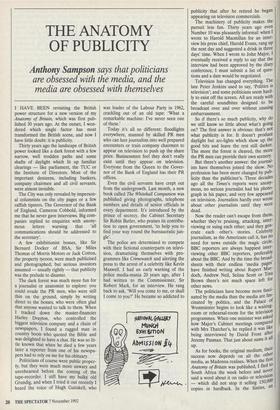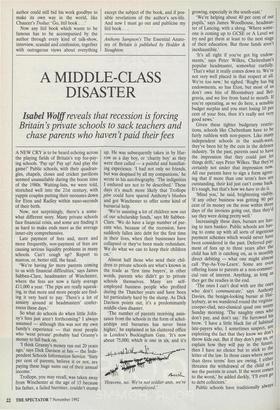THE ANATOMY OF PUBLICITY
Anthony Sampson says that politicians
are obsessed with the media, and the media are obsessed with themselves
I HAVE BEEN revisiting the British power structure for a new version of my Anatomy of Britain, which was first pub- lished 30 years ago. At the outset, I won- dered which single factor has most transformed the British scene, and now I have little doubt: it is publicity.
Thirty years ago the landscape of British power looked like a dark forest with a few narrow, well trodden paths and some shafts of daylight which lit up familiar clearings — like parliament, the TUC or the Institute of Directors. Most of the important denizens, including bankers, company chairmen and all civil servants, were almost invisible.
The City was only revealed by imperson- al columnists on the city pages or a few raffish tipsters. The Governor of the Bank of England, Cameron Cobbold, informed me that he never gave interviews. Big com- panies replied to enquiries with anony- mous letters warning that 'all communications should be addressed to the secretary'.
A few exhibitionist bosses, like Sir Bernard Docker of BSA, Sir Miles Thomas of Morris Motors or Jack Cotton, the property tycoon, were much publicised and photographed; but serious investors assumed — usually rightly — that publicity was the prelude to disaster.
The dark forest was much more fun for a journalist or anatomist to explore: you could evade the PR men, who were still thin on the ground, simply by writing direct to the bosses, who were often glad that anyone wanted to talk to them. When I tracked down the master-financier Harley Drayton, who controlled the biggest television company and a chain of newspapers, I found a rugged man in country boots who quoted the Bible and was delighted to have a chat. He was so lit- tle known that when he died a few years later a reporter from one of his newspa- pers had to rely on me for his obituary. Politicians of course were public proper- ty, but they were much more unwary and unrehearsed before the coming of the tape-recorder. I still have my bulky old Grundig, and when I tried it out recently I heard the voice of Hugh Gaitskell, who was leader of the Labour Party in 1962, crackling out of an old tape: 'What a remarkable machine: I've never seen one of these.'
Today it's all so different: floodlights everywhere, manned by skilled PR men who can lure journalists into well prepared encounters or train company chairmen to appear on television to push up the share price. Businessmen feel they don't really exist until they appear on television. Everyone from the Queen to the Gover- nor of the Bank of England has their PR offices.
Even the civil servants have crept out from the undergrowth. Last month, a new book called The Whitehall Companion was published giving photographs, telephone numbers and details of senior officials in every department. It's introduced by the prince of secrecy, the Cabinet Secretary Sir Robin Butler, who praises its contribu- tion to open government, 'to help you to find your way round the bureaucratic jun- gle'.
The police are determined to compete with their fictional counterparts on televi- sion, dramatising themselves with pro- grammes like Crimewatch and alerting the press to the arrest of a celebrity like Kevin Maxwell. I had an early warning of the police media-mania 20 years ago, after I had written to the Commissioner, Sir Robert Mark, for an interview. He rang back to ask, 'Will you come to me, or shall I come to you?' He became so addicted to
publicity that after he retired he began appearing on television commercials. The machinery of publicity makes the pursuit less fun. Thirty years ago even Number 10 was pleasantly informal: when I wrote to Harold Macmillan for an inter- view his press chief, Harold Evans, rang up the next day and suggested a drink in three days' time. When I wrote to John Major, I eventually received a reply to say that the interview had been approved by the diary conference, I must submit a list of ques- tions and a date would be negotiated. Television has changed everything. The late Peter Jenkins used to say, 'Politics is television'; and some politicians seem hard- ly to exist off the screen. All are ready with the careful soundbites designed to be broadcast over and over without causing embarrassment.
So if there's so much publicity, why do we still know so little about what's going on? The first answer is obvious: that's not what publicity is for. It doesn't produce daylight but arc-lights which show up the good bits and leave the rest still darker. The more the forest is cleared, the more the PR men can provide their own scenery.
But there's another answer: the journal- ists have themselves joined the show. No profession has been more changed by pub- licity than the publiciser's. Three decades ago all the Times's reports were anony- mous, no serious journalist had his photo- graph in his paper, and very few appeared on television. Journalists hardly ever wrote about other journalists until they were dead.
Now the reader can't escape from them, whether they're praising, attacking, inter- viewing or suing each other; and they gen- erate each other's stories. Celebrity journalism, as the Americans call it, has no need for news outside the magic circle. BBC reporters are always happiest inter- viewing other BBC reporters, preferably about the BBC. And by the time the broad; sheets with their endless 'media pages have finished writing about Rupert Mur- doch, Andrew Neil, Selina Scott or Tina Brown there's not much space left for other news. The politicians have become more fasci- nated by the media than the media are fas- cinated by politics, and the Palace. ef Westminster begins to look like a waiting room or rehearsal-room for the television programmes. When one minister was asked how Major's Cabinet meetings compared with Mrs Thatcher's, he replied it was like being interviewed by David Frost after Jeremy Paxman. That just about sums it all up. As for books, the original medium, their success now depends on all the other media, as Madonna realises. When the first Anatomy of Britain was published, I fled to South Africa the week before and neyer said a word about it on radio or television — which did not stop it selling 150,000 copies in hardback. In the Sixties, an
author could still bid his work goodbye to make its own way in the world, like Chaucer's Troilus: 'Go, litil book . .
Now any litil book which wants to be famous has to be accompanied by the author through every kind of talk-show, interview, scandal and confession, together with outrageous views about everything except the subject of the book, and if pos- sible revelations of the author's sex-life. And now I must go out and publicise my litil book ...
Anthony Sampson's The Essential Anato- my of Britain is published by Hodder & Stoughton.











































































 Previous page
Previous page